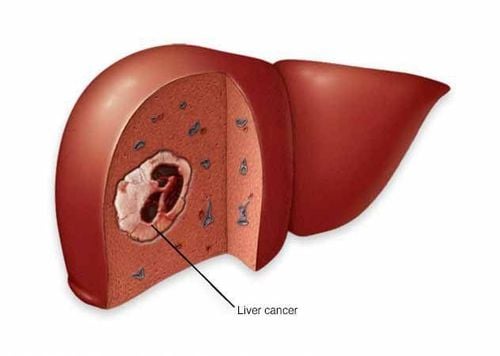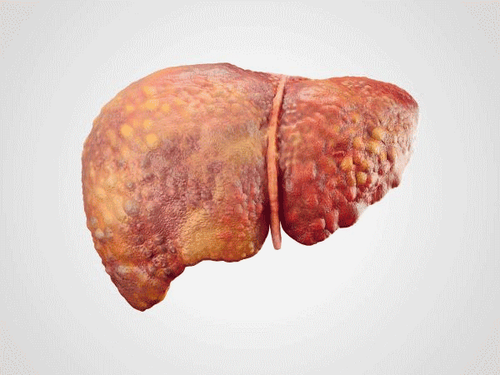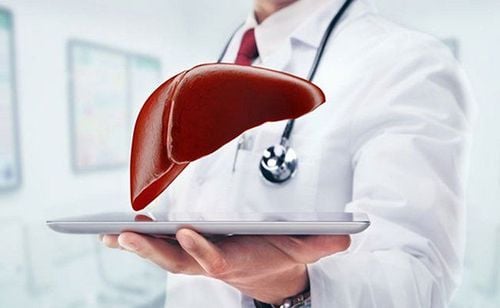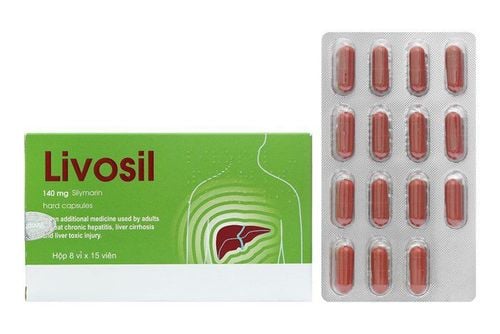This is an automatically translated article.
The article is professionally consulted by Master, Doctor Vu Tan Phuc - Gastroenterologist - Department of Examination & Internal Medicine - Vinmec Phu Quoc International General HospitalThe liver plays a very important role in the metabolism of several other functions of the body. Several factors such as infections, problems with the immune system, and genetic factors can affect liver function.
The liver is the place to provide the substances that the body needs, filter out harmful substances, convert food into energy for the body to function. So, once the liver has a problem and does not work well, it affects the whole body. The following problems can affect the functioning of the liver.
1. Liver disease caused by infection
Sometimes, an infection can cause hepatitis. Among them, viral hepatitis is the most common cause. Viral infections include:Hepatitis A : Most people get it from eating, drinking, or coming into contact with the products of an infected person. People infected with the hepatitis A virus may not have any symptoms and it usually goes away on its own within 6 months with no lasting harm. Hepatitis B : The patient gets the infection from another person through unprotected sex, sharing the drug with the infected person. If the condition persists for more than 6 months, the patient is at increased risk of liver cancer (the most serious type of liver disease) or other diseases. Hepatitis C: People get hepatitis C through exposure to infected blood through sharing needles or HIV-related drugs or from accidents in life as well as accidents at work. Symptoms of the disease may not appear for many years.
2. Have problems related to the immune system
The immune system is the place to fight against invaders including bacteria and viruses. However, sometimes it can also mistakenly attack one or more parts of the body, and the liver is no exception.Autoimmune hepatitis can lead to liver disorders and even liver failure. It is more common in women.
Primary cholangitis attacks the small tubes in the liver called the bile ducts. They carry bile, a chemical that helps the body digest food. When the ducts are damaged, bile stays inside the liver and causes scarring.
Primary cholangitis scar the bile ducts and block the ducts. When bile builds up inside the liver, it makes it harder for the liver to function. It can lead to liver cancer and may require a liver transplant.
3. Having cancer and tumors

Liver cancer or hepatocellular carcinoma is a fairly common disease in women. Patients with hepatitis or people who drink a lot of alcohol are more likely to develop liver cancer. Bile duct cancer attacks the tubes that run from the liver to the small intestine to carry bile, a fluid that helps digest food. This type of cancer mainly affects people over the age of 50 and is very rare. Hepatocellular adenoma is a rare and benign tumor. Usually occurs in women who take oral contraceptives for a long time. However, this tumor is still at risk of becoming cancerous.
4. Genetic factors
Some liver disorders run in families. The most common are the following:Hemochromatosis is a disorder caused by the body absorbing too much iron from food. Excess iron builds up in the liver, heart, or other organs, leading to life-threatening conditions such as liver disease, heart disease, or diabetes. Hyperoxaluria strikes when the urine has too much of a chemical called oxalate. Oxalate is a natural part of the body system, and the liver makes a chemical to control it. If the liver makes too little of that chemical, oxalate builds up and can cause kidney stones and kidney failure. Wilson's disease causes copper to build up in the liver and other organs. Its first symptoms usually appear between the ages of 6 and 35 and are most common in adolescence. The disease not only affects the liver but it can cause neurological and mental problems. Alpha-1 antitrypsin deficiency involves a chemical that helps the lungs fight infections. The liver is responsible for making that substance. But once there is a problem with the liver, chemicals can build up and cause liver disease.
5. Other causes of liver disease

Taking too much acetaminophen or other drugs can damage the liver. Adhering to the dosage instructions on the label and how much acetaminophen can be found in many of the medications we commonly take is crucial to protecting the liver.
Nonalcoholic fatty liver disease (NAFLD) is when too much fat builds up inside the liver. Excess fat can cause liver inflammation. Nonalcoholic steatohepatitis is inflammation of the liver and cell damage that leads to scarring of the liver and other disorders, such as cirrhosis.
Hepatitis if not detected and treated will have the risk of causing serious complications such as acute liver failure and cirrhosis. Acute liver failure is a disease that occurs after a harmful effect on the liver. It can happen from an acetaminophen overdose, an infection, or a prescription medication. Cirrhosis is the accumulation of scars in the liver. The more scarring that replaces healthy parts of the liver, the harder it is for the liver to do its job, and over time, it may not function properly.
Currently, Vinmec International General Hospital has Hepatobiliary Screening packages, which help detect hepatitis virus at an early stage even when there are no symptoms. In addition, the comprehensive hepatobiliary screening package helps customers:
Evaluate the liver's ability to work through liver enzyme tests; Evaluation of bile function; vascular nutrition; Early screening for liver cancer; Perform tests such as: total blood cell analysis, blood clotting ability, screening for hepatitis B and C; Assessment of hepatobiliary status through ultrasound images and diseases that have the potential to affect liver disease/exacerbation of liver disease; In-depth analysis of parameters to evaluate hepatobiliary function through laboratory and subclinical tests; the risk of affecting the liver and early screening for hepatobiliary cancer.
Please dial HOTLINE for more information or register for an appointment HERE. Download MyVinmec app to make appointments faster and to manage your bookings easily.
Reference source: Webmd.com













